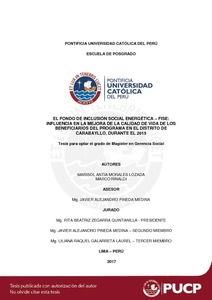| dc.contributor.advisor | Pineda Medina, Javier Alejandro | |
| dc.contributor.author | Morales Lozada, Marisol Antia | es_ES |
| dc.contributor.author | Rinaldi, Marco | es_ES |
| dc.date.accessioned | 2017-07-24T16:54:11Z | es_ES |
| dc.date.available | 2017-07-24T16:54:11Z | es_ES |
| dc.date.created | 2017 | es_ES |
| dc.date.issued | 2017-07-24 | es_ES |
| dc.identifier.uri | http://hdl.handle.net/20.500.12404/9120 | |
| dc.description.abstract | El trabajo de investigación se ha focalizado en Carabayllo, uno de los distritos
populares y con mayor extensión territorial de la provincia de Lima, donde se ha
encontrado una muestra diversificada de la población, condición favorable para
el estudio sobre los factores que influyen positivamente o limitan la
implementación del Fondo de Inclusión Social Energética- FISE.
El problema del acceso universal a la energía es transversal y trae consigo
consecuencias para la salud, economía y medio ambiente; esto afecta
diariamente a más de siete millones de peruanos en condición de pobreza o
pobreza extrema. En este contexto de tanta necesidad y exposición a riesgos
sociales y económicos se inicia el FISE en abril de 2012 siendo el Organismo
Supervisor de la Inversión en Energía y Minería – OSINERGMIN quien lo
administra, con el objetivo de “Crear un sistema de compensación energética,
que permita brindar seguridad al sistema, así como establecer un esquema de
compensación social y de servicio universal para los sectores más vulnerables
de la población en términos de pobreza.”1
La investigación está orientada a analizar si el FISE está contribuyendo al
desarrollo humano pleno y sostenible del país a través de sus ejes centrales: los
cuales son masificar el uso del gas natural; desarrollar nuevos suministros en la
frontera energética; y promover el acceso a Gas Licuado del Petróleo (GLP) a
través de vales de descuento para la adquirir un balón de GLP. La investigación
es cualitativa y comprenderá la realización de entrevistas semi-estructuradas a
los actores involucrados, así como la revisión documental pertinente.
El análisis del FISE desde un enfoque de gerencia social, según los hallazgos
del trabajo de campo, y el estudio de la problemática a nivel macro, ha permitido
al equipo de investigadores, elaborar conclusiones y recomendaciones además
de una propuesta de mejora, para reforzar los resultados positivos de la
intervención del FISE y minimizar aquellos aspectos limitantes del mencionado
Programa. | es_ES |
| dc.description.abstract | The research work has been focused on the reality of the district of Carabayllo,
Metropolitan Municipality of Lima, due to the fact that favorable conditions have
been found for the development of a more direct study on the factors that
influence or limit the implementation of the Social Inclusion Energy Fund – FISE
in Spanish.
The pending issue of universal access to energy is transversal and with
consequences for health, economy and environment and represents a problem
that daily suffer more than seven million of Peruvians living in a condition of
poverty or extreme poverty.
In a context of so high need and exposure to social and economic risks, FISE is
officially launched on April 2012, with the Supervisory Agency for Energy and
Mining – OSINERGMIN in Spanish managing it temporarily, with the general
objective of creating an energy compensation system that provides security for
the system and establishes a scheme of social compensation and universal
service to the most vulnerable sections of the population in terms of poverty.
In this way, the objective of this research is to analyze whether FISE is
contributing to the country's full and sustainable human development through
activities articulated with its specific objectives, which are: 1) to increase the use
of natural gas; 2) to develop new supplies on the energy frontier; 3) to promote
access to LPG through discount bills for the purchase of an LPG balloon.
As a consequence, the research used is qualitative and will include semistructured
interviews with the actors directly involved, as well as the relevant
documentary review.
Therefore, the analysis of the FISE program from a social management approach
and based on fieldwork findings as well as the study of macro problems have
allowed the research team to elaborate a series of conclusions and
recommendations, moreover a proposal for improvement that aims at reinforcing
the impact of the intervention of the program and at minimizing those aspects that
are currently undermining both its action in the territory of Carabayllo and the
development of the residents of this district. | es_ES |
| dc.description.uri | Tesis | es_ES |
| dc.language.iso | spa | es_ES |
| dc.publisher | Pontificia Universidad Católica del Perú | es_ES |
| dc.rights | info:eu-repo/semantics/openAccess | es_ES |
| dc.rights.uri | http://creativecommons.org/licenses/by-nc-nd/2.5/pe/ | * |
| dc.subject | Política energética--Perú | es_ES |
| dc.subject | Inclusión social | es_ES |
| dc.subject | Programas sociales | es_ES |
| dc.subject | Desarrollo humano | es_ES |
| dc.title | El Fondo de Inclusión Social Energética - FISE: influencia en la mejora de la calidad de vida de los beneficiarios del programa en el distrito de Carabayllo, durante el 2015 | es_ES |
| dc.type | info:eu-repo/semantics/masterThesis | es_ES |
| thesis.degree.name | Maestro en Gerencia Social | es_ES |
| thesis.degree.level | Maestría | es_ES |
| thesis.degree.grantor | Pontificia Universidad Católica del Perú. Escuela de Posgrado | es_ES |
| thesis.degree.discipline | Gerencia Social | es_ES |
| renati.discipline | 314127 | es_ES |
| renati.level | https://purl.org/pe-repo/renati/level#maestro | es_ES |
| renati.type | http://purl.org/pe-repo/renati/type#tesis | es_ES |
| dc.publisher.country | PE | es_ES |
| dc.subject.ocde | https://purl.org/pe-repo/ocde/ford#5.09.00 | es_ES |






